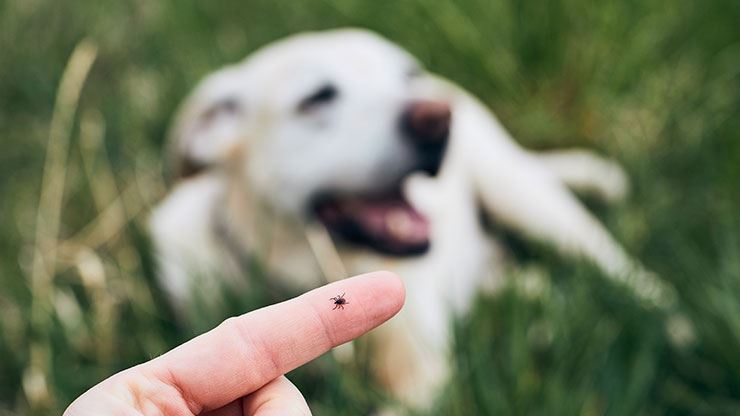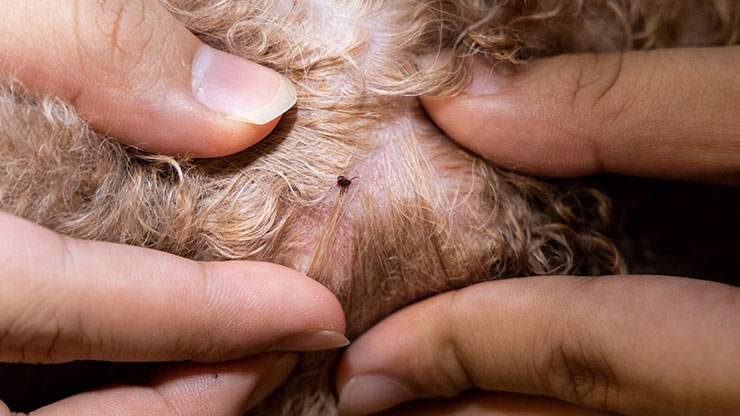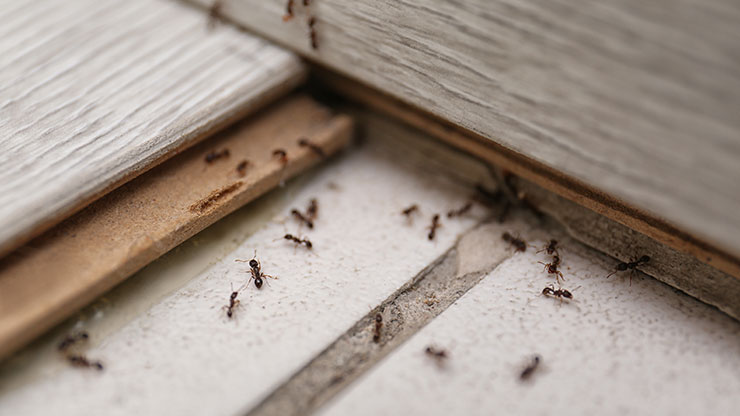
How to Identify and Combat Common Household Pests Harmful to Dogs
Bugs and pests are not just a nuisance to us. They are also a potential health risk for our four-legged family members. But which pests should you be worried about, and how do you know what you’re dealing with? Here, we discuss the most common pests found in and around your home that could be harmful to your furry friends.
Ticks
If you’re out camping, hiking through the woods, or have a woodsy backyard, check your dog’s fur carefully for ticks. If you find any, use tweezers to carefully remove the tick(s). Ticks can cause illnesses, including Lyme disease, anemia, and even paralysis. Symptoms of a tick bite might include a change in the pitch of your dog’s bark, vomiting, and difficulty breathing. Pet owners can prevent tick bites by using vet-approved tick-prevention medications.
Mosquitoes
While mosquito bites on us are itchy and annoying, the threat to dogs is a bit more severe. Mosquitoes carry diseases such as West Nile, Zika virus, and heartworm, which, if left untreated, can kill a dog within a short amount of time.
Prevent mosquito bites on your dog (and yourself) by following these guidelines:
- Do not walk your dog during peak mosquito-biting times (dawn and dusk).
- Talk to your vet about safe mosquito repellents and heartworm prevention.
- Eliminate all standing water on your property. Mosquitoes can reproduce in the smallest amount of water, so removing any standing water from your yard is vital to minimizing the mosquito population.
If you notice your pup is scratching more than usual, rubbing its ears or nose against a rough surface or has red welts similar to mosquito bites on people, they probably have gotten bitten by some mosquitoes.
Fleas
Fleas are nuisances — pure and simple. Adult fleas will feed on your pet’s blood and produce eggs that they lay in their fur to restart the life cycle. In general, fleas are not a severe health concern. However, major flea infestations can cause anemia and even death. You can prevent fleas with medication approved by your vet.
Look for these signs your pet has fleas:
- Your dog may be itching more than usual.
- His skin may be irritated, red, or have scabs.
- As you look closer, you may spot adult fleas jumping.
- You might see flea eggs, which look like tiny white dots.
- Tiny black specks on your furniture or pet’s bed are dried blood from the fleas.
To eliminate a flea infestation, you’ll need to talk to your vet and possibly have your house treated by a pest company. In the meantime, giving your dog a bath with dish soap will help get rid of the fleas, and after that, using an oatmeal shampoo will help relieve the itching.

Bees, Hornets, and Wasps
A bee sting is uncomfortable for anyone, whether they have two legs or four. One or two stings likely won’t harm your pet too much, but the danger comes when a dog unexpectedly steps in or disrupts a hive. When that happens, the insects swarm and will sting multiple times, causing severe pain and discomfort or even an allergic reaction.
If you know your pet was stung, but it’s not severe, try removing the stinger (if you can find it) to help reduce the pain. You can also apply ice and a paste made of baking soda and water. If your pet is vomiting, has diarrhea, or has a hard time breathing after being stung, you should call the vet and take them to the emergency clinic right away.
Ants
While ants won’t use your dog for a free ride, they will attack if they feel threatened. Dogs (and sometimes people) playing in the yard don’t realize they’re standing on a fire ant hill until it’s too late. The ants come out in droves to protect their home and latch onto the intruder’s skin, biting aggressively. Carpenter ants, sugar ants, and pavement ants may also bite, but they’re much less aggressive and territorial.
If your pet has been bitten by fire ants, you can apply a paste of baking soda and water to neutralize the venom and ice packs for the swelling. You can also try rubbing on a hydrocortisone cream or aloe vera gel to help soothe any itching or pain.

Stink Bugs
Stink bugs might hitch a ride on your dog, but thankfully, these bugs are typically pretty harmless. However, if your dog eats one or two, they might throw up from the nasty secretion the bug uses as its defense. If your dog is throwing up and you’re concerned, always contact your veterinarian.
Spiders
Most spiders your dog comes into contact with aren’t harmful. Only two spiders –– the brown recluse and the black widow –– have venom that could harm your dog. Contact your veterinarian immediately if you suspect your dog has come in contact with either of these spiders.
You can prevent spiders from coming inside by spraying the perimeter of your home with a vinegar solution. The strong smell will help to keep spiders from entering your home, and –– bonus points: it also repels mosquitoes.
Conclusion
If you notice your dog is consistently covered in bugs, do some investigation around your house. You might have an infestation you didn’t know about. Or maybe your dog has a blood condition that attracts bugs to them –– in that case, talk to your vet about remedies.
Overall, if you’re unsure what to do if your dog is bitten or stung or has eaten something they’re not supposed to, don’t panic. Reach out to your local emergency vet or call your veterinarian.
---

About the Author
Tammy has an extensive background in journalism, media relations, social media strategy, marketing, and brand management. She resides in Michigan with her family, which includes her two sons and their Goldendoodle, Max. In her free time, she loves to read and travel.










